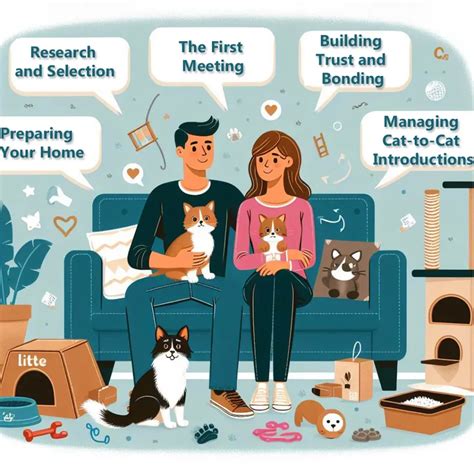In a world where stress levels are at an all-time high, finding effective and accessible stress relief methods has become paramount. Enter the world of cat parenting – a therapeutic companionship that offers a myriad of benefits, including significant stress reduction. Studies have consistently shown that interacting with cats can lower blood pressure, decrease anxiety levels, and promote relaxation. Hence, embracing cat parenting can be a pivotal step towards a healthier and less stressful life.

Understanding the Cat-Human Connection
The bond between cats and humans is a complex and fascinating one. Cats have evolved to be highly attuned to human emotions, making them exceptional companions for those seeking emotional support and stress relief.
Cats possess a natural ability to sense and respond to stress in their owners. When they detect elevated stress levels, they often initiate behaviors that are known to have calming effects, such as:
- Purring: The rhythmic vibrations emitted by a cat’s purr have been scientifically proven to reduce stress and anxiety in humans.
- Headbutting: Cats express affection and calmness by headbutting their owners, which releases calming pheromones that have stress-reducing effects.
- Kneading: Also known as “making biscuits,” cats engage in this behavior when they are feeling content and relaxed, unknowingly transmitting these positive emotions to their owners.
Research-backed Benefits of Cat Parenting for Stress Relief
Numerous scientific studies have explored the stress-relieving benefits of cat parenting. Here are some key findings:
- Lowered Blood Pressure: Studies have shown that interacting with cats for just 15 minutes can significantly reduce blood pressure, making cat parenting a simple and effective way to manage hypertension.
- Reduced Anxiety: Cats have been found to have a calming effect on people with anxiety disorders. Their presence can alleviate symptoms such as nervousness, restlessness, and racing thoughts.
- Improved Sleep Quality: Cats can help regulate sleep patterns by promoting relaxation and providing a sense of security, ultimately leading to improved sleep quality.
- Increased Endorphin Release: Interacting with cats stimulates the release of endorphins, which have mood-boosting and stress-relieving properties.
The Unique Personality of Cats: A Key Ingredient for Stress Relief
Cats possess a diverse range of personalities, each offering unique therapeutic benefits:
- Playful and Energetic: Active cats can provide a playful distraction from stress, encouraging exercise and laughter, which are known to release stress hormones.
- Independent and Affectionate: Independent cats offer companionship without being overly demanding, allowing their owners to de-stress in their own space. Affectionate cats, on the other hand, provide ample cuddles and purring, directly reducing stress levels.
- Calm and Zen-like: Cats with calm temperaments can create a soothing atmosphere in the home, promoting relaxation and reducing anxiety.
Creating a Stress-Free Environment for Your Feline Companion
To maximize the stress-relieving benefits of cat parenting, it’s crucial to create a nurturing and stress-free environment for your feline friend. This includes:
- Providing a Safe and Comfortable Space: Cats need a dedicated space where they can feel safe and secure. This space should include cozy bedding, scratching posts, and hiding spots.
- Ensuring Regular Veterinary Checkups: Regular veterinary checkups are essential for detecting and preventing any health issues that could impact your cat’s well-being and, consequently, your own stress levels.
- Offering a Variety of Toys and Activities: Engage your cat with interactive toys, puzzle feeders, and climbing structures to keep them mentally stimulated and reduce boredom, which can lead to stress.
- Respecting Your Cat’s Boundaries: Give your cat space when they need it. Avoid overwhelming them with excessive petting or attention, as this can increase their stress levels.
Conclusion: The Paw-er of Cat Parenting for Stress Relief
In a world where stress is omnipresent, cat parenting emerges as a highly effective and accessible stress relief method. The unique bond between cats and humans, coupled with their calming behaviors and research-backed benefits, makes them exceptional companions for those seeking to reduce stress and improve their well-being. Embracing the joys of cat parenting can lead to a more balanced, stress-free, and fulfilling life.
Frequently Asked Questions
- Are all cats good for reducing stress? While most cats can provide stress relief, their individual personalities may vary. It’s important to choose a cat that matches your lifestyle and personality.
- How long do I need to interact with my cat to experience stress relief? Studies have shown that even 15 minutes of interaction with a cat can significantly reduce stress levels.
- What if I’m allergic to cats? Hypoallergenic cat breeds, such as Cornish Rex and Balinese, can be a good choice for those with mild allergies. However, it’s always recommended to spend time with a cat before adopting one to assess your allergy levels.
- Can cats help with anxiety disorders? Cats have been found to have a calming effect on people with anxiety disorders. They can provide comfort, companionship, and a sense of security, which can help reduce anxiety symptoms.
- Do cats require a lot of attention? The amount of attention a cat requires depends on its personality. Some cats are more independent, while others crave more affection. It’s important to choose a cat that fits your lifestyle and availability.
- How much does it cost to own a cat? The cost of owning a cat can vary depending on factors such as food, veterinary care, and grooming. On average, it can cost around $500-$1,000 per year to own a cat.
- Is it better to have one cat or two? Whether you get one or two cats depends on your lifestyle and preferences. Two cats can provide companionship for each other, but they also require more space, food, and attention.
- What are the signs of a stressed cat? Cats may show signs of stress through behaviors such as excessive hiding, changes in appetite, scratching, or vocalization. If you notice these signs, it’s important to try to identify the source of stress and provide a calming environment for your cat.





















